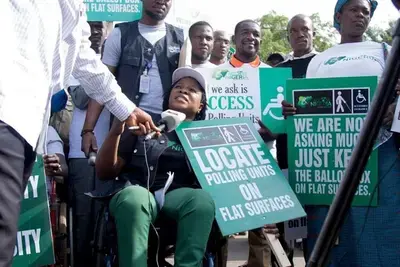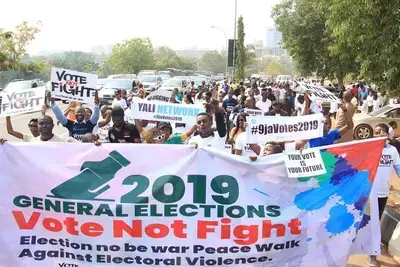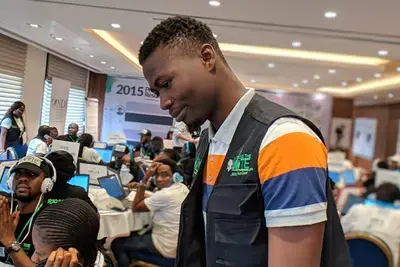
Success Story
Unique Nigerian Website Presents Complete 2011 Election Observation Data as Country Prepares for New Polls
An innovative Nigerian website, the first of its kind in the world, which uses infographics and maps to present the findings of citizen observers from the country’s 2011 presidential elections, has been launched as Nigeria prepares for new polls next year.
The site was created by the Transition Monitoring Group (TMG), Nigeria’s largest citizen election observation organization, with technical assistance from NDI. The interactive website, http://www.tmgtowards2015.org/, lays out visually all of the data that TMG’s citizen election monitors gathered in 2011.
Speaking at the public launch of the site in Abuja on Aug. 26, TMG Chairman Zikirullahi Ibrahim (Comrade Zik) said, “This website serves as a baseline for assessing improvement in Nigeria’s electoral process over time. Moreover it can and should be used as a voter education tool for citizens, civil society organizations and political parties.”
In the run-up to the 2011 elections, Nigerians and the international community expressed serious concern about the possibility of electoral misconduct. Ever since Nigeria returned to civilian rule in 1998-1999, its national elections had been characterized by widespread illegal voting, missing voting materials and polling stations that opened late or not at all. In addition, the Independent National Electoral Commission (INEC) was suspected of announcing fraudulent results.
In an effort to provide citizen oversight in 2011, TMG dispatched specially selected and trained observers to polling stations across the country to conduct a parallel vote tabulation (PVT), locally known as a “quick count.” Based on the data that observers texted in from a statistically valid sample of polling units, TMG found that the official results accurately reflected the votes cast. Despite some irregularities in the process, TMG concluded that the quality of the elections had vastly improved since 2007.
“Civil society groups monitoring elections gather huge amounts of data that’s relevant to citizens,” said Patrick Merloe, senior associate and director of electoral programs at NDI. “This is the first time that one of those groups has made that information fully accessible. It’s setting a really powerful precedent for citizen efficacy and engagement.”
Through the TMG website, users can explore information about critical electoral issues in 2011 and learn more about the quick count methodology. Users also can visualize instantly any of the data gathered by electoral issue -- such as whether ballots were properly counted or if polling stations opened on time -- or by geographical region on a map of Nigeria.
But more than just a repository of information, the site is a tool that political parties, citizen observer groups, electoral officials and civic organizations can use to improve democratic processes. The stakes are high as the 2015 elections approach, and many Nigerians are looking for opportunities to engage.
Previously, very little data from Nigerian elections was in the public domain, but now, through the TMG site, activists can identify where problems arose and can target resources more effectively.
For example, detailed maps at the state and local government levels illustrate where polling stations opened late, how parties performed across the country, and where voters experienced harassment and intimidation, among other things.
“No election is perfect, but they can get better,” Merloe said. “The goal of the website is to give citizens the information to judge the quality of the elections for themselves and gauge whether they are improving.”
TMG’s quick count methodology has bolstered faith in the elections and Nigerian democracy as the country heads into new elections.
“This is novel in the history of the Nigerian electoral process,” said Comrade Zik. “It’s popular among Nigerians, knowing that someone other than INEC is keeping track of what is going on during the elections.”
Published Sept. 19, 2014



